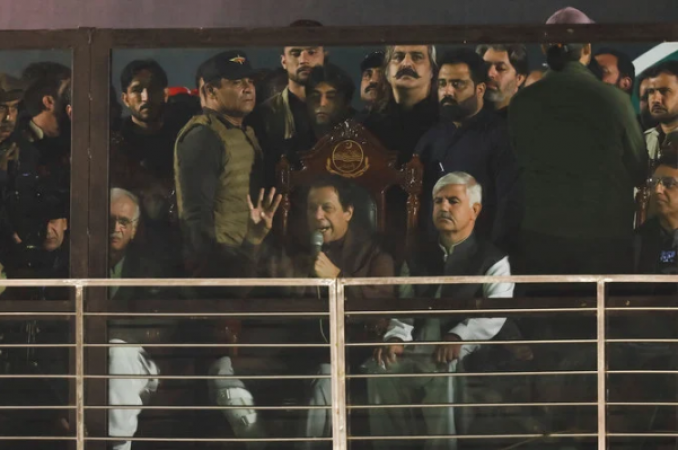
Islamabad: Pakistan's former prime minister Imran Khan on Sunday announced that his party was quitting the country's regional and national assemblies in an attempt to mount more pressure on the current administration. Khan was ousted in a no-confidence vote in parliament in April.
Khan, a former cricket star turned politician, is currently in the opposition. Since then, he has called for early elections, held several anti-government rallies, and often claimed that his ouster was the result of a US-backed "foreign conspiracy". Washington and Khan's rivals, who are now in power, have denied all these claims.
In his first public appearance since being wounded in a shootout earlier this month, the leader of the Pakistan Tehreek-e-Insaf party called off a protest march that was to begin in the eastern city of Lahore and end in Islamabad on Saturday. had to happen.
Also Read: FIFA WORLD CUP: What to watch out for in today’s matches
Furthermore, he announced that the PTI was leaving a "corrupt system" and that it would no longer participate in the country's regional and national assemblies, to the cheers of tens of thousands of supporters.
According to political analyst Dr. Huma Bakai, the announcement was a new step after months of urging early elections, after Khan's story "weakened due to repetition".
"The economy is everyone's primary concern, and after the mass resignations by the PTI, the situation will worsen, put the government on the defensive, and may force them to hold early elections," he continued.
Pakistan is grappling with an economic crisis triggered by devastating floods that killed more than 1,700 people, high inflation, and dwindling foreign reserves.
According to the former Pakistani attorney general, the most recent political development "may put pressure" on the current government.
According to Anwar Mansoor Khan speaking to Arab News, "However, they tried it in the National Assembly but failed. How long the government can withstand the pressure depends on the intelligence."
After Khan was removed from office in April, a wave of PTI lawmakers voted to elect a new prime minister before abruptly leaving the National Assembly.
According to Arab News senior journalist Arifa Noor, Khan's choice "could create a lot of problems" for the federal government and was motivated by a recent change in military command.
According to Noor, they want to put more pressure on the new army commander to accept their demand for early elections.
Also Read: Beirut's "neighbourhood watch" recalls the city's troubled past
Lieutenant General Asim Munir was on Thursday appointed as the chief of staff of Pakistan's army, a body that is crucial to the country's governance and which has nuclear weapons. Khan and the army had differences over the appointment; Khan blamed the military for his ouster.
According to Ahmad Bilal Mehboob, chairman of the Pakistan Institute of Legislative Development and Transparency, the mass resignation of PTI was done to "create the possibility of political disruption".
According to Mehboob, by doing this he keeps the pressure on the government and conveys to the army the importance of using its power to avert any possible disruption.
Mehboob said Khan, who claimed he canceled his protest march because he was concerned it would destabilize the country, was "running out of options." At this point, he could only threaten to resign from the provincial assemblies to maintain the momentum of his campaign.
However, there are still questions about Khan's announcement. Political analyst Musharraf Zaidi told Arab News, "Resignation from assemblies will not have the same effect as dissolution."
In reference to PTI's stronghold in the north-west province of Khyber Pakhtunkhwa and Khan's coalition government in Punjab with the Pakistan Muslim League, Zaidi said that the PTI's threat to dissolve the KP and Punjab Assemblies was "actually meant to be will be needed." Really challenge the federal government."
According to Kanwar Dilshad, a former secretary of the Election Commission of Pakistan, Khan's announcement lacked detail because he did not specify "whether he would dissolve the assemblies or just resign," adding that for each option, There will be different effects.
Also Read: Our goal is to become the world's largest nuclear power: Kim Jong-un
"The dissolution of the legislatures could result in a genuine constitutional crisis, forcing the federal government to call early elections,"